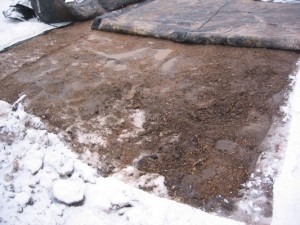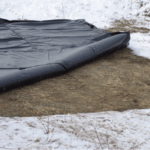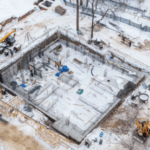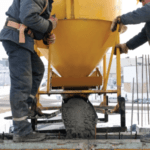Concrete is the backbone of most construction projects, and often an early step before other tasks can be started. Limiting concrete work to warm weather days is restrictive and costly. If you wait for the weather to break, you might find yourself waiting a long time. During winter conditions, extra precautions must be taken before you pour.
Pouring on Frozen Ground
Soil expands or heaves when it freezes. Once the ground inevitably thaws, it will slump and settle, which will crack the concrete. When in contact with frozen ground, concrete will set much more slowly or the hydration process will stop altogether.
When the ground is frozen, and concrete will not set completely, it can look set on top. However, underneath it will not be cured strong enough to handle pressure and stress. Pouring fresh concrete directly onto frozen ground may seem like a time saving option, but will lead to costly delays, repairs, and re-pours.
Ground Thaw Methods
Concrete crews have used a wide variety of warming methods to try and melt ice and snow and prep frozen ground before a pour.
Hydronic Heaters
Hydronic heaters use a pump to run a heating fluid (typically a water and glycol mix) through a series of rubber tubes. These tubes are laid out in a pattern over the surface of the ground that needs to be thawed. While hydronic heaters can usually cover a lot of ground, they are time consuming to set up and do not provide the insulation needed to prevent heat loss into the air.
Heated Enclosures
Some crews choose to build a heated enclosure to cover the area, and wait for it to thaw. This method is sometimes used in combination with other heating methods. The downside of these enclosures is that energy is being diverted to warming the ambient air as well, instead of projecting heat into the ground.
Drilling Holes
In some cold climates, crews try drilling holes into the ground and injecting hot water or steam. Aside from the increase in labor, this practice can also introduce excess water into the pour site, which will cause the concrete to cure more slowly.
Fire
The use of propane torches, or strategically placed fires, is another way concrete crews have tried to thaw ground before a pour. With this method, very little heat is actually penetrating into the ground. Also, even in winter conditions, the unnecessary use of open flames around a construction site is not a safe or air-friendly practice.
Insulation
Placing down a layer of insulation, in the form of straw or an insulating blanket, is intended to let geothermal forces the ground thaw out naturally. This method may possibly be efficient if the temperatures are barely around freezing, but is not effective for deep freezes or severe winter conditions.
Heated Ground Thaw Blankets
Electrically powered ground heating blankets are the most effective way to thaw frozen ground before a pour. They provide the insulation needed to prevent heat loss and direct thermal energy downward into the ground where it is needed most. In addition to insulation, they also contain a safe, even heat source for faster and more efficient thawing. Heated ground thaw blankets are much easier and less finicky to install, and don’t require the constant maintenance as some of the other methods mentioned above. By placing it down and walking away, a crew’s time is freed up to accomplish other tasks.
Powerblanket Winter Concrete Solutions
Avoid the financial crunch of the “off season.” With Powerblanket, there is no “off season.” Our heavy duty ground thaw blankets put you back on your schedule, not mother nature’s. With evenly dispersed heat, our ground thaw blankets can thaw 12-18 inches of frozen ground daily, and thaw to a total depth of 6 feet.
Once your ground is thawed, Powerblanket’s heavy duty concrete curing blankets will help you cure faster even in the deepest of winter conditions. Learn more about concrete blankets here, and contact us to find a solution for your concrete needs 855.763.9254 or [email protected]
Frequently Asked Questions
Can you pour concrete on top of frozen ground?
Pouring concrete on frozen ground is not recommended as it can lead to cracking and settling issues; instead, use methods like heated ground thaw blankets to properly prepare the site.
How cold is too cold for concrete pouring?
Concrete should not be poured if temperatures are below 40 degrees Fahrenheit, as it risks freezing and improper curing, which can compromise the structural integrity.
How do you thaw frozen ground for concrete?
Thaw frozen ground effectively by using heated ground thaw blankets, which provide consistent thermal energy to ensure a stable base for concrete pouring.
What is the lowest temperature you can pour concrete at?
The lowest temperature for pouring concrete is generally above 40 degrees Fahrenheit to ensure proper hydration and curing, avoiding any potential freezing issues.
Time is money. Don't waste time waiting for the ground to thaw. Powerblanket has you covered.






